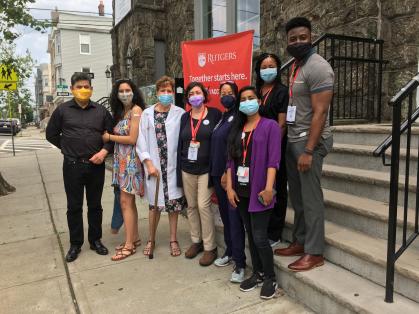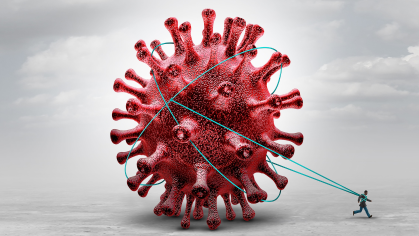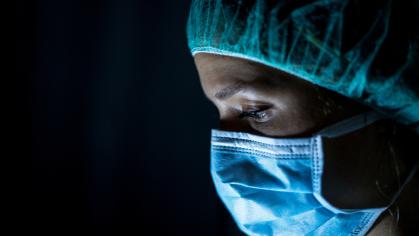Rutgers community outreach programs focus on hard-hit populations

As the COVID-19 Delta variant spreads and infection rates surge in New Jersey, Rutgers University faculty and staff have been helping to improve vaccination rates in hard-hit areas.
Tailored messages, real-time data and trusted community partners have contributed to their efforts in Newark, New Brunswick and across the state.
The Rutgers Global Health Institute, as part of its Equitable Recovery program and in collaboration with local partners, recently organized multiple pop-up clinics at places such as Family Manor Restaurant and Greater Abyssinian Church in Newark and Elijah’s Promise and St. Joseph Church in New Brunswick. Their work has helped vaccinate 580 people to date.
“People may think New Jersey as a whole is doing well, but the reality is very different in certain neighborhoods with low vaccination rates where the variants are more likely to encroach and severely affect the community,” said education and training manager Arpita Jindani, who leads the Equitable Recovery program at the institute.
According to the state Department of Health's COVID-19 dashboard, New Jersey has vaccinated about 5.3 million of its residents, accounting for more than 70 percent of the eligible population. In Newark and New Brunswick, 54 percent and 44 percent of 18 or older residents are vaccinated, respectively.
Rutgers Global Health Institute partners with organizations that understand where the greatest needs are, such as the South and West Wards in Newark and Esperanza neighborhood in New Brunswick, and analyzes the Centers for Disease Control and Prevention social vulnerability index and poverty levels. The balance between data and strong community partners has been the key to reaching these communities, said Jindani.
Jindani and her colleagues worked with New Brunswick Tomorrow and other members of the Healthier New Brunswick Coalition, as well as the New Jersey Department of Health, the Newark Department of Community Health and Wellness, and North Jersey Community Research Initiative, which help to administer vaccines at the sites.
The institute also partnered with Family Manor Restaurant in Newark, where the population is primarily Caribbean and Haitian, to host a pop-up clinic. By working with the restaurant’s owner, a trusted messenger who hosts a local radio show, they also reached Irvington and East Orange residents. These cities have among the lowest vaccination rates in the state.
Similarly, when Noa’a Shimoni, an associate professor of family medicine at New Jersey Medical School and chief medical officer of Rutgers-Newark’s Stonsby vaccination clinic worked with site staff, including clinical nurse leader Devin McNair and pharmacist Marissa Smith, to set up pop-up vaccine clinics at Newark’s Luso-Brazilian Seventh-day Adventist Church, she knew the parish’s popularity would provide the personal connection needed to get residents interested. Another driver of the weekend’s success was WhatsApp, a free messaging app that allows people to make calls and text message over Wi-Fi.
“Specifically in the Ironbound neighborhood, much of the population comes from Central and South America where WhatsApp is widely used,” said Shimoni, who, alongside colleagues, has vaccinated 75 people at events at Saint Joseph’s Adventist, Mantena Global Health and a transitional homeless shelter at a Holiday Inn. “Many of the residents use WhatsApp to communicate, and word spread about the clinics over the app.”
These events are supported by Rutgers VAX Corps, a group supporting COVID-19 vaccination efforts at the university. Shimoni said the pop-ups provide interprofessional students, faculty and staff an opportunity to administer vaccines outside of Rutgers clinics and in atypical environments.
“Going out into the community during off-hours and on the weekends and meeting individuals at their point of need are essential to reaching our local communities,” said Shimoni. “From a preventive care perspective, serving New Jersey residents in any way that works for them will help us all live in a healthier population.”
The RU Vaccine Scheduling Assistance Program helped schedule vaccinations at some of these sites. To date, the hotline has received close to 1,500 phone calls and scheduled 700 appointments for New Jersey residents at Rutgers clinics or external clinics when requested. The goal is to help as many people as possible find an appointment wherever they prefer, said John Hemphill, who coordinates the program. The call center is staffed by testing assistants from Rutgers Environmental Health and Safety and contact tracers from the Rutgers School of Public Health. Spanish speakers are also available to answer calls.
Other hard-to-reach populations include migrant farmworkers, said Cara Cuite, an assistant extension specialist in the Department of Human Ecology in the Rutgers School of Environmental and Biological Sciences.
Cuite coleads Rutgers Cooperative Extension Farmworker Immunization Education and Outreach, which connects farmers and migrant seasonal farmworkers to the New Jersey health care system. The group works with the state’s Department of Health and provides information to the state's agricultural community about how farmers can help employees understand the value of and access vaccines. From early June through mid-August, one-third to one-half of the state's seasonal migrant farm labor workforce arrives in Hammonton and the surrounding communities to harvest blueberries, says Cuite.
“Trustworthiness, expertise and accessibility are important communications principles that may help influence New Jerseyans to get their shot,” said Leslie Kantor, a professor and chair at the Rutgers School of Public Health.
Kantor and Denise Rodgers, vice chancellor of interprofessional programs at Rutgers Biomedical and Health Sciences (RBHS), are working with Believe in a Healthy Newark—an organization improving health outcomes in Newark’s South and West Wards—to better reach these communities in digital platforms. Students at the School of Public Health are using specific communications principles to creatively and effectively provide vaccine information through the web, Instagram, Facebook and Twitter. Their work has resulted in broader engagement across the organization’s web presence.
Additionally, as part of an awareness and messaging campaign led by Rutgers University–Camden and the Center for Family Services in Camden, 14 local barbers have been tapped as community ambassadors for the safety and importance of COVID-19 vaccines. Fifty percent of Camden residents 18 or older are vaccinated.
“People describe hard-to-reach populations, but in my opinion, they're not hard-to-reach,” said Jindani. “They're hardly reached. Many do not provide support because they don't speak the language, don't feel comfortable going to certain areas or are unsure where to start. Given our work in public health and addressing health inequities, these vulnerable groups can be given the information and access they need.”




